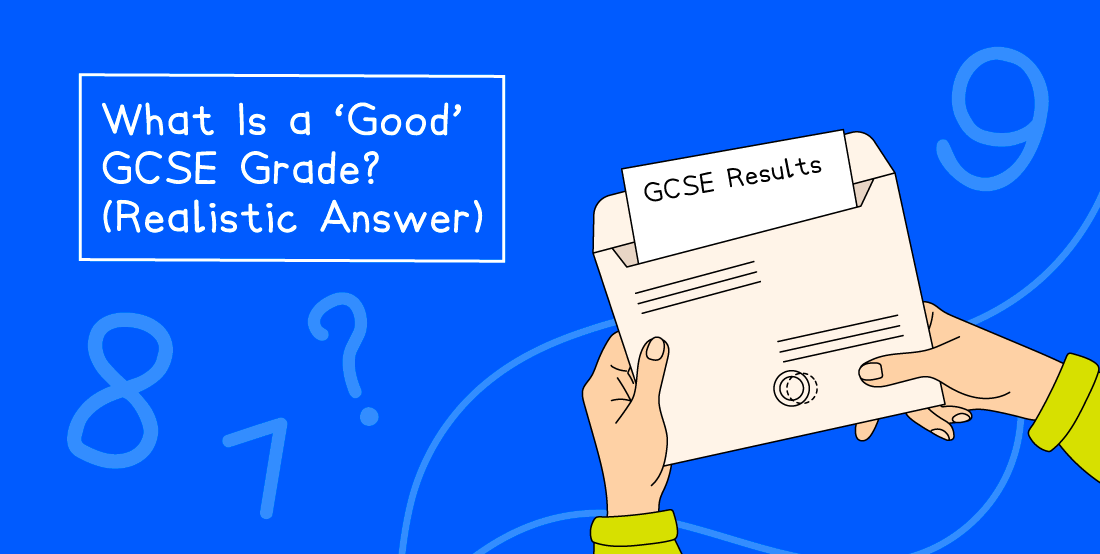What Is a ‘Good’ GCSE Grade? (Realistic Answer)
Written by: Lisa Eades
Reviewed by: Charlotte
Published

Contents
- 1. What Is A Pass At GCSE?
- 2. What Is Considered A ‘Good’ GCSE Grade?
- 3. What’s The Average GCSE Grade?
- 4. What GCSE Grades Do Sixth Forms and Colleges Look For?
- 5. What GCSE Grades Do Universities Look For?
- 6. What GCSE Grades Do Oxford and Cambridge Look For?
- 7. What GCSEs Do Employers Look For?
- 8. What A ‘Good’ GCSE Grade Looks Like For You
- 9. Score Top GCSE Grades with Save My Exams
This article will guide you through everything you need to know about GCSE grades. My students often ask, “What’s a good GCSE grade?” or “How do my grades affect my future options?” Whether you’re aiming for sixth form, university, or a career, understanding your GCSE results is key.
I’ll explain what counts as a pass, what a "good" grade looks like, and why those grades matter. You’ll also learn how GCSEs impact your next steps, from further education to employment, and how your personal goals shape what’s “good” for you. I’ll also highlight grade trends and comparisons across subjects to help you better understand where you stand and what to aim for.
What Is A Pass At GCSE?
In England, GCSEs are graded from 9 to 1, with 9 being the highest and 1 the lowest. This system replaced the older A* to G grades to make student performance clearer.
A grade 4 is called a “standard pass” and is similar to the old grade C. Getting a grade 4 in subjects like English or Maths meets the basic requirements for many jobs and courses. A grade 5, known as a “strong pass,” shows a better understanding and can improve your opportunities.
The 9-1 system is more detailed than the old grades, with grades 8 and 9 highlighting top performers. Knowing this system helps you set goals for sixth form, college, or other plans.
What Is Considered A ‘Good’ GCSE Grade?
A grade 5 or higher is seen as a good result, especially in key subjects like English, Maths, and Science. These grades help you move on to A-levels, vocational courses, or apprenticeships.
Grades 7, 8, and 9 are excellent and stand out in competitive areas like top universities or sixth forms. A grade 7 shows strong knowledge, a grade 8 reflects advanced understanding, and a grade 9 means exceptional performance. In 2024, about 21% of GCSEs were graded 7 or higher. Achieving these grades often requires good preparation and revision.
Recent trends show that students in London and the South East often achieve higher grades compared to other regions, with factors like access to quality teaching and resources playing a role. However, what matters most is how your grades help you achieve your individual goals, whether that’s further study, training, or entering the workforce.
What’s The Average GCSE Grade?
In 2024, 61.9% of students got a grade 4 or higher in English Language. Fewer reached grades 7-9 compared to English Literature, which often has slightly better results.
Maths remains tricky, with 59.5% earning at least a grade 4. Top grades like 8 or 9 are rare because Maths requires strong problem-solving skills. Practice and extra support can help improve results.
Science students taking single science subjects (Biology, Chemistry, Physics) usually score higher than those taking Combined Science because of the extra teaching time.
Languages like French and German saw more students earning top grades in 2024 compared to 2019. Subjects like History and Geography also showed improvements, with more students achieving grades 7-9. Business saw a steady increase in grades 6 and above, while Physical Education showed strong results, particularly for those achieving grades 7 or higher. Creative subjects like Art and Drama often result in grades 5 or 6, rewarding creativity and effort.
What GCSE Grades Do Sixth Forms and Colleges Look For?
A Levels and Academic Courses:
Most sixth forms and colleges require at least five GCSEs at grades 4 to 9, including English and Maths. Specific subjects like Maths or Science may require a grade 6 or 7 to ensure readiness for advanced study.
Vocational Courses (e.g., BTECs, T Levels):
For Level 3 vocational courses (equivalent to A Levels), four or five GCSEs at grades 4 to 9 are typically needed. For Level 2 courses, grades 3 or higher in most subjects may suffice.
Apprenticeships:
Intermediate apprenticeships (Level 2) usually require GCSE grades 3 or higher. Advanced apprenticeships (Level 3) often ask for five GCSEs at grades 4 to 9, including English and Maths.
English and Maths:
A grade 4 in English and Maths is crucial for most courses. Students who don’t achieve this must continue studying these subjects alongside their chosen programme.
What GCSE Grades Do Universities Look For?
General Requirements:
Most universities expect at least five GCSEs at grades 4-9, including English and Maths. Specific courses may have higher requirements.
Subject-Specific Examples:
Medicine: Competitive courses often demand top grades. The University of Nottingham, for instance, requires at least six GCSEs at grade 7.
Engineering: Strong grades in Maths and Science, usually grade 6 or higher, are essential.
Psychology: Many courses require a grade 6 in Maths, such as those at the University of Sheffield.
Competitive Universities:
Prestigious institutions, including the Russell Group, value a high proportion of grades 7-9. For example, University College London (UCL) requires a grade 4 or higher in a modern foreign language for all of its courses.
Strong GCSE results help admissions tutors assess your academic consistency. For example, achieving top grades in subjects related to your intended course, like grade 9 in Maths for Engineering, indicates you are well-prepared.
While eight GCSEs are often sufficient, it’s the quality of the grades—not the quantity—that matters most. Grades 8 and 9 in key subjects are particularly valuable.
What GCSE Grades Do Oxford and Cambridge Look For?
Oxford and Cambridge place significant emphasis on GCSE grades as part of their holistic admissions process. While there are no strict requirements, most successful applicants tend to have a high proportion of grades 8 and 9. These grades demonstrate exceptional academic ability and a strong foundation for the rigorous courses offered by these universities.
What Do They Expect?
Oxford: High GCSE grades are particularly important for competitive courses like Medicine or Law. Applicants for Medicine, for example, typically have mostly grades 8 and 9, especially in Maths and Science.
Cambridge: Cambridge looks at your GCSE grades alongside the performance of your school. If you’ve excelled in an environment where fewer students achieve top grades, this will be taken into account, showing recognition of your individual achievements.
What GCSEs Do Employers Look For?
Employers often require a minimum of grade 4 in English and Maths to demonstrate essential literacy and numeracy. For competitive roles or apprenticeships, grades 6 or above may be preferred.
In addition to academic performance, employers value work experience and extracurricular involvement. These activities highlight skills such as teamwork, problem-solving, and leadership, which are crucial for success in the workplace.
Combining strong GCSEs with relevant experiences creates a well-rounded profile, increasing your competitiveness in job applications.
What A ‘Good’ GCSE Grade Looks Like For You
A “good” GCSE grade depends on your goals and personal journey. For some, grades 7-9 are essential for competitive sixth forms or careers. For others, achieving grade 4s in key subjects like English and Maths opens doors to apprenticeships or vocational courses.
What truly matters is your personal progress and resilience. For example, moving from a grade 2 to a 4 shows determination and hard work—a success that deserves recognition. Resilience helps you tackle challenges, whether it’s retaking a subject or working steadily to improve.
Focus on your own journey rather than comparing yourself to others. GCSEs are just one step in your future. With effort and determination, your results can lead you toward the path that’s right for you. Whatever your results, they can help you move forward with the right effort and determination.
Score Top GCSE Grades with Save My Exams
Here at Save My Exams, we create high-quality, course-specific revision resources. Our resources are written and created by leading specialists who know their subjects inside and out. We pride ourselves on being exam-board specific, so you can trust that you are accessing the right information for your course.
Explore Our GCSE Revision Resources
References
GCSE grades 2024: The 9-1 boundaries explained - BBC News
GCSE results 2024: The main trends in grades and entries - FFT Education Datalab
Careerpilot : Get information : GCSEs : How your GCSE grades could affect your choices at 16
How Many GCSEs Do You Need For University? - NCC Blog
GCSE results 2024: French and German grades improve in languages boost
Sign up for articles sent directly to your inbox
Receive news, articles and guides directly from our team of experts.

Share this article


 written revision resources that improve your
written revision resources that improve your